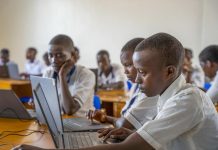Africa-Press – South-Africa. The matric class of 2022 was severely affected by the Covid-19 pandemic that hit when they were in Grade 10.
As a result of the pandemic and disruptions to the education system, the Department of Basic Education was forced to revise the syllabus so they could be promoted.
According to department spokesperson Elijah Mhlanga, the current matrics had not been able to sit for exams like the classes that came before them.
Instead, they had to write controlled tests as part of the revised annual teaching measures used to recover from the pandemic.
“The prelim exams were the first exams they wrote. We are worried because what this class has gone through, no other class has [been] through in the history of the exam. We need to support them in any way we can. Parents must also do their part in terms of supporting them.”
Mhlanga was speaking at a briefing by Umalusi in Johannesburg on Friday about the state of readiness for the management and conduct of the 2022 national examinations.
According to Mhlanga, candidates were in study camps across the country preparing for the National Senior Certificate (NSC) exams.
While they are the first group to write exams in two years with no Covid-19 restrictions, the biggest problem hanging over the examinations is load shedding and whether it will not cause disruptions.
Umalusi said while it was ready to administer the exams, it was worried about the impact of load shedding.
CEO Mafu Rakometsi said:
“The request that we have made to the department is that they bring to the attention of Eskom the dates when these exams will be written. Eskom should be requested to ensure that there is no load shedding at that time. We are not in full control of the situation. We can only appeal to Eskom, the districts… to improvise.”
Mhlanga said load shedding was not a big worry as exams are done during the day. “The problem is studying. Learners need to adjust their lives around that.”
He said if load shedding happened when candidates wrote Computer Applications Technology or Information Technology, they would be given alternative dates to write.
Early this year, schools in KwaZulu-Natal were damaged in devastating floods.
Rakometsi said that, at the time, the province had assured him that schools would be repaired in time for the exams.
“Where that is not possible… the students will have to be taken to centres where they will be able to write. Where the system has failed, there will be some improvisation made.”
‘Refrain from all forms of copying’
Mhlanga said most of the schools affected were primary schools. He said the department would organise exam centres in cases where high schools were affected and not repaired.
This year, 923 460 matric candidates are registered for the NSC certificate. An additional 13 567 candidates will sit for the Independent Examination Board assessments.
The public school exams will be written between 25 October and 6 December. IEB assessments will run from 20 October to 29 November.
Rakometsi said:
Umalusi’s senior manager for quality assurance of assessment, Mary-Louise Madalane, said they also had centres in Eswatini for both NSC and IEB exams.
She said the NSC exams would be written in 6 885 centres.
Madalane said question papers had been approved and moderated, and that the selection of markers selection would be finalised by 30 October.
She said some of the shortcomings they had identified ahead of the exams include a shortage of examination staff, storage points that are not compliant with their standards – especially in Limpopo – and a shortage of markers in some subjects in Mpumalanga and KwaZulu-Natal.
“The identified shortcomings are not of such a magnitude that they have the potential to put the credibility of the examinations at risk. Umalusi appreciates the effort made by all assessment bodies in putting systems in place to ensure that the integrity of the 2022 national examinations is not compromised.”
For More News And Analysis About South-Africa Follow Africa-Press






